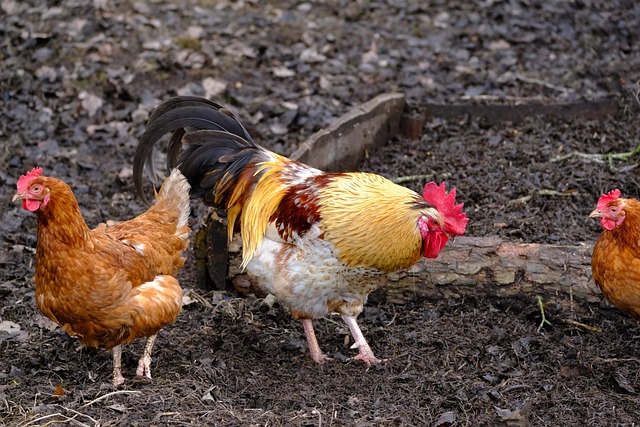Backyard chicken keeping has been gaining popularity recently as a sustainable and rewarding hobby. However, with this hobby comes the concern of attracting pests like rats. Rats are known to carry diseases and cause damage to property, making it important to understand whether backyard chickens have the potential to attract rats.
The answer is yes, backyard chickens can potentially attract rats due to their feed, water, waste, and shelter. However, backyard chicken keepers can prevent rats by securing chicken feed, managing water sources, properly managing chicken waste, securing the chicken coop, removing clutter and debris, and installing rat deterrents.
In this article, I will explore and answer the question of whether backyard chickens attract rats or not in detail and provide information to help backyard chicken keepers maintain a safe and clean environment for their chickens and themselves.
Understanding the Rat Problem
Before we dive into whether backyard chickens attract rats, it’s important to understand the rat problem in general. Rats are omnivorous rodents that are known to be carriers of various diseases such as leptospirosis, salmonellosis, and hantavirus. They are attracted to areas with readily available food, water, and shelter.
Factors that can attract rats to an area include:
- Poor sanitation practices
- Cluttered or overgrown areas
- Access to food and water sources
- Gaps or holes in buildings or fences that rats can use for entry or exit
- Overcrowding of rats in neighboring areas
Rats are a danger to both human health and the health of animals, making it essential to take measures to prevent and control their presence in your backyard.
Backyard Chickens: A Potential Attraction for Rats
Now, let’s focus on the question at hand: Do backyard chickens attract rats? Unfortunately, the answer is yes, backyard chickens can potentially attract rats.
The reasons why chickens could attract rats are:
- Chicken feed: Rats are attracted to chicken feed, which is often stored in bulk and can be easily accessible. They will also eat the chicken’s food directly from the feeder, which can leave a mess and attract more rats.
- Water sources: Chickens require fresh water, which can attract rats if left out in the open or if there are water leaks. Rats will also drink from chicken waterers, which can cause contamination.
- Chicken waste: Chicken manure and bedding are rich in nutrients that rats can use as a food source. If chicken waste is not properly managed, it can attract rats to the area.
- Shelter: Chicken coops can provide shelter for rats, especially if they are not properly sealed or if there are holes or gaps that rats can use for entry.
In addition, there are other ways that backyard chickens could indirectly attract rats. For example, rats may be attracted to other animals that are attracted to chicken feed, such as wild birds or squirrels. Also, rats can be attracted to food scraps in compost piles that are used to fertilize the garden where chickens may roam.
Therefore, it’s important for backyard chicken keepers to take steps to prevent rats from being attracted to their chickens and their backyard environment.
Preventing Rats in the Backyard
To prevent rats from being attracted to backyard chickens, it’s important to take measures to avoid providing them with food, water, and shelter. Here are some tips for deterring rats in your backyard:
- Secure chicken feed: Store chicken feed in airtight containers that rats cannot access. Also, consider feeding chickens only the amount of food they will eat within a day to reduce leftover food that could attract rats.
- Manage water sources: Change chicken water regularly, and ensure that water sources are not leaking or spilling. Consider using a waterer with a lid to prevent rats from accessing the water.
- Properly manage chicken waste: Clean the chicken coop regularly and compost manure in a secure bin that rats cannot access. Avoid overfilling the bin and make sure it’s securely sealed.
- Secure the chicken coop: Seal any gaps, holes, or cracks in the chicken coop to prevent rats from entering. Also, consider placing a hardware cloth floor under the coop to prevent rats from digging underneath.
- Remove clutter and debris: Keep your backyard clean and free of clutter, which can provide hiding spots for rats.
- Install rat deterrents: Consider using natural rat deterrents, such as peppermint oil, or mechanical deterrents like ultrasonic devices or snap traps.
By taking these preventative measures, backyard chicken keepers can reduce the risk of attracting rats to their backyard environment.
Conclusion
In conclusion, backyard chickens can potentially attract rats if proper preventative measures are not taken. Rats are attracted to chicken feed, water sources, and chicken waste, as well as any shelter the coop may provide. Backyard chicken keepers can prevent rats from being attracted to their chickens by securing chicken feed, managing water sources, properly managing chicken waste, securing the chicken coop, removing clutter and debris, and installing rat deterrents.
Maintaining a clean and safe backyard environment not only benefits the chickens but also protects human health from the dangers associated with rats. By following these tips, backyard chicken keepers can enjoy the many benefits of raising chickens without the worry of attracting rats to their backyards.










